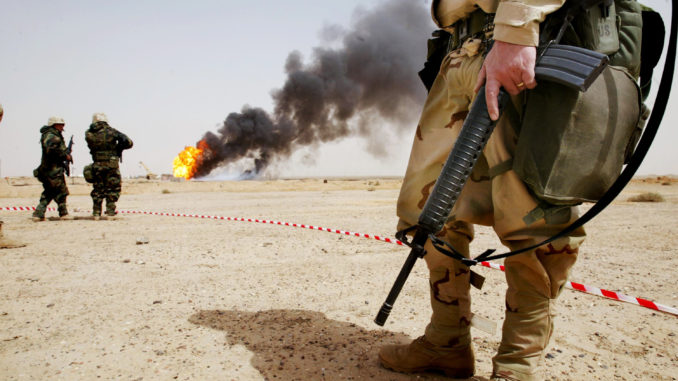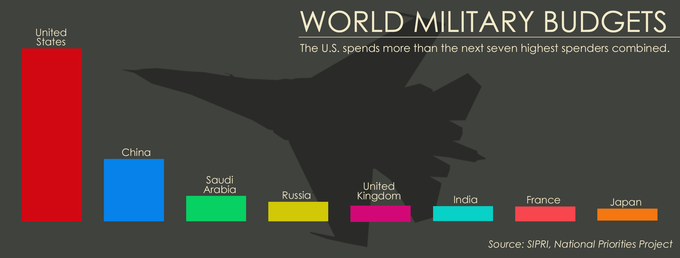
Come you masters of war
You that build all the guns
You that build the death planes
You that build the big bombs
You that hide behind walls
You that hide behind desks
– Bob Dylan, Masters of War, 1963
The US Senate passed a $700 billion defense policy bill on Monday that puts the US on track to have the largest military budget since the height of the wars in Iraq and Afghanistan.
The bill, known as the National Defense Authorization Act (NDAA), had enormous bipartisan support in a vote of 89-9.
It includes $640 billion for the Pentagon – $37 billion more than Trump requested – and $60 billion for US wars in Iraq, Afghanistan, Syria, and beyond.
The NDAA approves an $80 billion annual increase for military spending, and authorized the production of ninety-four F-35 jets, twenty-four more than the Pentagon requested.
The new bill allots millions to boost the militaries of other countries, including $705 million to Israel and $500 million to Ukraine.
The NDAA still has to be adjusted to align with the version of the bill passed by the House in June before Trump can sign into law, which is expected to happen later this year.
The Senate backing of the bill is part of a long tradition in US politics of bipartisan support for staggering military budgets.
In 2016, the US military budget made up one third of all global military expenditures.
The US already has a military budget that is larger than that of the next seven countries combined, including China, Saudi Arabia, Russia, the UK, India, France, and Japan.

The passage of the bill comes at a time of increased tension between the US the North Korea, and a marked rise in bombing in Afghanistan, Iraq, and Syria.
The Pentagon recently reported that US planes have dropped 2,400 bombs in Afghanistan this year so far, up from the 1,337 dropped on the country in 2016. The US dropped 5,075 bombs in Iraq and Syria during the month of August, the highest monthly amount since the bombing campaigns against ISIS officially began in August of 2014.
Such bombing campaigns have surged across US administrations. In 2016 alone, under Obama, the US dropped 26,172 bombs in seven countries, primarily Iraq and Syria.
According to Air Wars, a non-profit organization monitoring casualties and coalition nations’ bombing of ISIS in Iraq, Syria, and Libya, 98,532 bombs have been dropped on these countries by coalition forces since the war on ISIS began.
In such a climate of war, eighty-nine senators voted for the NDAA on Monday, and only eight voted against it, including Senators Kirsten Gillibrand (D-N.Y.), Pat Leahy (D-Vt.), Jeff Merkley (D-Ore.), Ron Wyden (D-Ore.), Bernie Sanders (I-Vt.), Ron Paul (R-Ky.), Mike Lee (R-Utah), and Bob Corker (R-Tenn.).
Critics have pointed out the irony of most senators’ unquestioning bipartisan support for the $700 billion dollar military budget at a time when increased demands for Medicare for All and free tuition at public colleges and universities in the US are spreading.
One of Senator Sanders’ presidential campaign proposals during the 2016 election was to make tuition free at public colleges and universities. Democrats and Republicans alike said the plan was too costly. However, the $80 billion annual increase in military funding approved with the NDAA would cover the free tuition proposal, as The Intercept journalist Alex Emmons pointed out. Sanders’ plan would cost the government only $47 billion per year.
Of course, critics of US imperialism around the world have long denounced Washington’s extensive military reach and oversized war budget.
The Afghan anti-war activist and former politician Malalai Joya once spoke out against the Obama administration’s 2011 military budget, which was $11 billion more than the current NDAA.
“Spent in the right way,” Joya said, “this huge amount could ensure peace and prosperity around the world.”
***
Benjamin Dangl is the editor of TowardFreedom.com, a progressive perspective on world events. He has a PhD in history from McGill University and his dissertation is Centuries March the Streets: The Power of the Past in Bolivian Indigenous Movements, 1970-2000.
